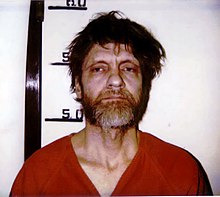Ted Kaczynski
| Ted Kaczynski | |
|---|---|

Kaczynski after his capture by police in 1996
|
|
| Born |
Theodore John Kaczynski May 22, 1942 Evergreen Park, Illinois, U.S. |
| Other names | The Unabomber |
| Alma mater |
Harvard University University of Michigan |
| Occupation | Professor, mathematician |
| Criminal charge | Transportation, mailing and use of bombs; murder |
| Criminal penalty | 8 life terms without parole |
| Criminal status | Incarcerated at ADX Florence, #04475–046 |
| Conviction(s) | January 22, 1998 (pleaded guilty) |
Theodore John "Ted" Kaczynski (/kəˈzɪnski/; born May 22, 1942), also known as the "Unabomber", is an American anarchist and domestic terrorist. A mathematical prodigy, he abandoned a promising academic career in 1969, then between 1978 and 1995 killed three people, and injured 23 others, in a nationwide bombing campaign targeting people involved with modern technology. In conjunction with this campaign he issued a wide-ranging social critique opposing industrialization and modern technology, and advancing a nature-centered form of anarchism.
Kaczynski was born and raised in Evergreen Park, Illinois. While growing up in Evergreen Park he was a child prodigy, excelling academically from an early age. Kaczynski was accepted into Harvard University at the age of 16, where he earned an undergraduate degree. He subsequently earned a PhD in mathematics from the University of Michigan. He became an assistant professor at the University of California, Berkeley in 1967 at age 25. He resigned two years later.
As a Harvard undergraduate, Kaczynski was among twenty-two students who were research subjects in ethically questionable experiments conducted by psychology professor Henry Murray from late 1959 to early 1962.
In 1971, he moved to a remote cabin without electricity or running water, in Lincoln, Montana, where he lived as a recluse while learning survival skills in an attempt to become self-sufficient. Seventeen years after beginning his mail bomb campaign, Kaczynski sent a letter to The New York Times on April 24, 1995 and promised "to desist from terrorism" if the Times or The Washington Post published his manifesto, Industrial Society and Its Future (the "Unabomber Manifesto"), in which he argued that his bombings were extreme but necessary to attract attention to the erosion of human freedom necessitated by modern technologies requiring large-scale organization.
...
Wikipedia
